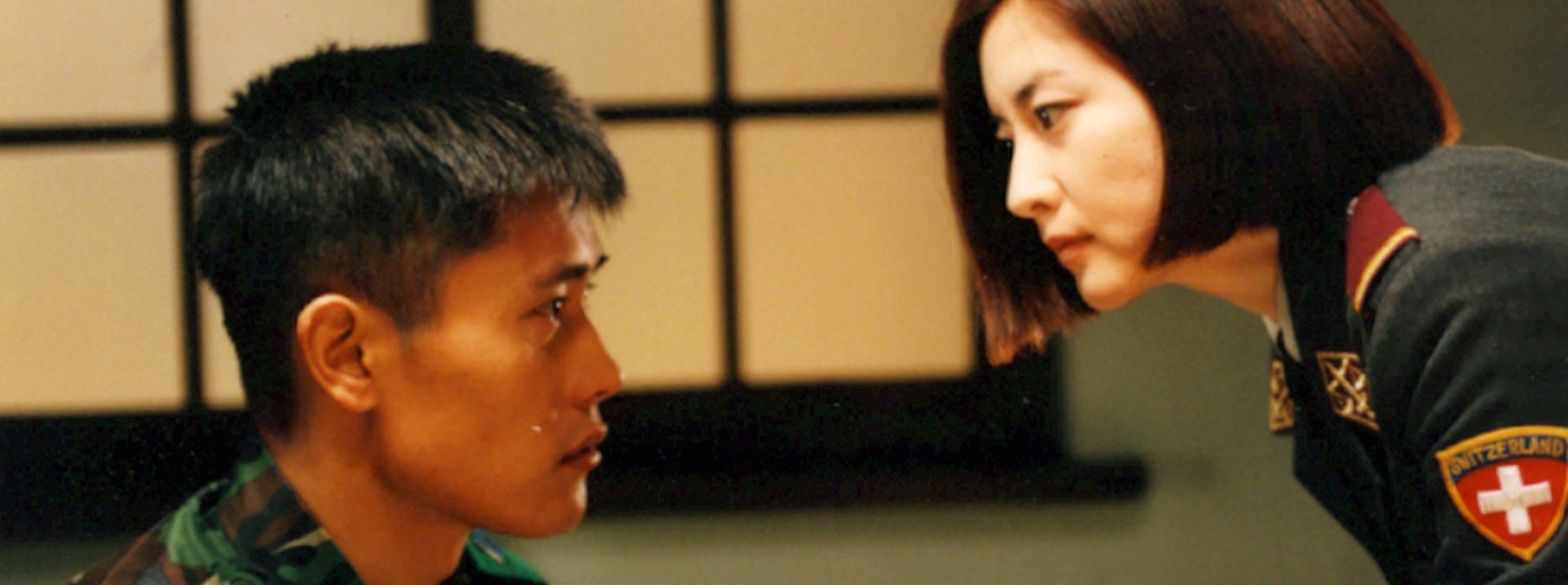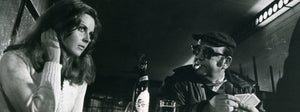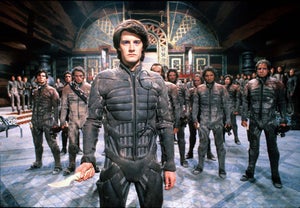
Bong Joon-ho may have taken home all the plaudits in 2020 with the landslide success of Parasite, but few could argue that he’s been the only beacon for South Korean cinema over the past twenty years. In fact, many were surprised that it wasn’t a different director to finally win an Oscar for South Korea. For all he’s done for the Hallyu wave, Park Chan-wook could be forgiven for feeling a little slighted.
While he remains best known in the West for vengeance juggernaut Oldboy, BAFTA-winning thriller The Handmaiden, or even recent BBC television series The Little Drummer Girl, Park’s big-screen prominence actually stems back to 2000, with the release of his third feature film Joint Security Area. A dramatic mystery that attempts to unravel the motive behind a fatal clash of border guards at the Demilitarized Zone (DMZ), it broke box office records in South Korea, forever changing the course of the country’s film industry in the process.
This was a film that dared to do something that had never been done before: to show North Korean characters in a genuinely sympathetic light. And while capturing the zeitgeist of an era of massive cultural and political transformation in the South, the director also proved on a technical scale that his nation’s cinema could stand up to the Hollywood imports that were flooding the country. It was a watershed moment — not only for Park, and actors Song Kang-ho (Parasite) and Lee Byung-hun (I Saw The Devil), who all became stars — but for Korean cinema, both at home, and on the international stage.
To understand the significance of a film like JSA, one must go all the way back to the end of the Korean War. A ceasefire treaty signed in 1953 between the communist North and capitalist South had permanently split the country into two after a millennium of unification. Korea was now divided by a four-kilometre-wide, 250-km-long buffer. It remains, to this day, the site of a tense stalemate — and it is here that the events of JSA are set.
But with successive military regimes imposing strict, oppressive rulership on both sides of the border in the wake of the Korean war, it would take decades for any kind of Korean cinema to truly prosper. In the South, strict censorship, production regulation and restrictive filmmaking policies made it impossible to produce work that didn’t fit the defined political agenda of “North Korea bad; South Korea good.” The film industry of South Korea was, until the ‘90s, one of the most tightly regulated on the planet. How could a film so contrary to this ideology even get off the ground?
1997 was the turning point. As a financial crisis incited economic meltdown across much of East Asia, a spike in unemployment devastated South Korea. The citizens responded by electing Kim Dae-Jung: the first truly liberal President in half a century. It was the first peaceful transfer of power between governments in modern Korean history.
With the Korean won plummeting in value, the cost of importing films from the West became significantly expensive. Korean films had made up just 16% of attendance figures at cinemas in 1993 — how could the President incite a cultural recovery to put Korea back on the world stage?
Kim opted to double down on a long-standing screen quota law that dictated that home-grown features must take precedence on Korean cinema screens. Then he offered substantial new incentives to get Korean-made productions off the ground. With these support systems in place, a new generation of cinephiles brought up on Hollywood movies (a new constitution had relaxed import restrictions in 1988) found themselves transforming the country’s film industry from the inside out. These were the seeds that would guide much of the Hallyu wave in the decades to come.
JSA was a bold statement in terms of filmmaking standards, then. The first South Korean film to use Super 35mm widescreen cameras, it was proof of the serious efforts to modernise the country’s industry. And by framing the bulk of the film within Major Sophie Jean (Yeong-ae Lee)’s English-language deposition, and utilising a Hitchcockian strings score throughout, director Park even offers a nod to a Hollywood noir blueprint. In the early scenes of the film, Silence of the Lambs provides a solid reference point for audiences at home and abroad.
President Kim’s pursuit of the so-called ‘Sunshine Policy’, though, would prove even more significant in paving the path for the success of a film like JSA. In a move that would see him awarded the Nobel Peace Prize in 2000, the President sought to stimulate kinder relations between the North and the South through mainstream media, encouraging the liberally-minded ‘90s generation to identify with their neighbours. Just three months before JSA was released, history was made when Kim Dae-jung and North Korean premier Kim Jong-il held a summit in Pyongyang. It was the most visible thawing of tensions between the two countries since the end of the Korean War.
With this in mind, JSA’s story proved highly contemporary. This was a tragic drama about friendships formed between jaded North and South Korean soldiers — compassionate characters acting on human emotion rather than political interests — that captured the hope of a generation no longer defined by an enforced nationalistic fervour. Because while the characters on-screen are initially defined as opposites through their uniforms, Park makes a great effort to show their similarities, too: by framing each character symmetrically on opposite sides of the DMZ borderline; capturing them on a 360-degree rotating camera that blurs each face into the next; and by using mirror-image jump cuts.
It helps that a great deal of care was taken in portraying North Korean attitudes with integrity, as well. The script was adapted in part by North Korean defector Jeong Seong-san, and the completed film was eventually even gifted to Kim Jong-il in 2007 as a show of respect. As South Korean sergeant Lee Soo-hyeok (Lee Byung-hun), states at one point: “is it a sin to joke around with someone who’s just like me? Of the same ethnicity?”
The most financially successful South Korean film of all time upon its release, JSA was nominated for the Golden Bear at the Berlin Film Festival in 2001. With the festival taking place at Potsdamer Platz — the site of Germany’s own former demilitarized zone, the Berlin Wall — the film’s themes took on an international relevance. It was a vital example of South Korean cinema transcending borders while also being of a quality to compete with the films of Europe, Hollywood and China. And though it didn’t win, the commercial viability of Korean films would continue to improve. In 2002, box office admissions for native productions surpassed those of international imports for the first time in years, with Korean films’ market share peaking in 2006 at 64%.
The legacies of director Park and Korean cinema remain highly visible in 2020, but one scene in JSA feels particularly prescient today. A Western tourist visiting the DMZ drops her hat over the division line into “enemy” territory; as North Korean sergeant Oh passes it back, the bright red cap could be easily mistaken for one of Donald Trump’s ‘Make America Great Again’ markers. It’s an alarming reminder of the country-wide divisions that exist in the West today, but also a hopeful indication of the positive outcomes that can be achieved by working with compassion.
Meanwhile, the Hallyu wave, the Bong-hive and Parasite’s Oscars scoop? It all started here. Ignore JSA at your peril — on the 20th anniversary of its cinematic release it remains as relevant as ever.
https://www.youtube.com/watch?v=MauXL12WWZc

Related Articles








